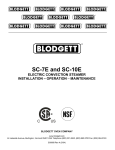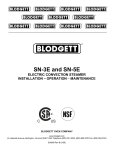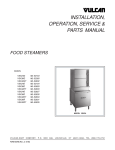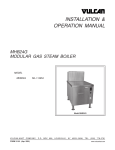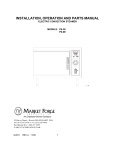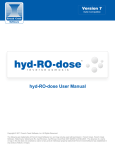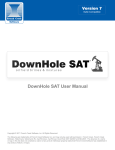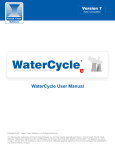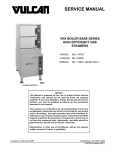Download Blodgett SC-10E Specifications
Transcript
SC-7E and SC-10E ELECTRIC CONVECTION STEAMER INSTALLATION – OPERATION – MAINTENANCE BLODGETT OVEN COMPANY www.blodgett.com 44 Lakeside Avenue, Burlington, Vermont 05401 USA Telephone: (802) 658-6600 Fax: (802) 864-0183 1 B (7/10) S00058 Rev IMPORTANT NOTES FOR INSTALLATION AND OPERATION This is the safety alert symbol. It is used to alert you to potential personal injury hazards. Obey all safety messages that follow this symbol to avoid possible injury or death. WARNING: Improper installation, operation, adjustment, alteration, service or maintenance can cause property damage, injury or death. Read the installation, operating and maintenance instructions thoroughly before installing, operating or servicing this equipment. Adequate clearances must be maintained for servicing and proper operation. Intended for commercial use only. Not for household use. This manual should be retained for future reference. 2 TABLE OF CONTENTS DESCRIPTION PAGE 1.0 Service Connections ............................................................................................. 4 2.0 Installation Instructions ........................................................................................... 5 3.0 Operation ............................................................................................................. 9 4.0 Cleaning .............................................................................................................. 13 5.0 Maintenance ...................................................................................................... 15 6.0 Troubleshooting.................................................................................................... 16 7.0 Service ................................................................................................................ 17 3 1.0 SERVICE CONNECTIONS ELECTRICAL CONNECTION: 1-1/8" hole for electrical connection. Rating to be as specified on data plate. DRAIN: 1"IPS to open floor drain. No solid connection. Use copper only, 24" length before open air gap opening (No bends or elbows). GENERATOR WATER: 3/8" O.D. tubing at 25-50 PSI (170-345 kPa) C CONDENSING WATER: 3/8" O.D. tubing at 25-50 PSI (170-345 kPa) WATER QUALITY STATEMENT WATER QUALITY IS THE MAJOR FACTOR AFFECTING THE PERFORMANCE OF YOUR APPLIANCE. IF YOU ARE UNSURE OF WATER QUALITY, CONSULT A LOCAL WATER TREATMENT SPECIALIST AND HAVE THE WATER ANALYZED. YOUR WATER SUPPLY MUST BE WITHIN THESE GENERAL GUIDE LINES: TOTAL DISSOLVED SOLIDS LESS THAN 60 PPM TOTAL ALKALINITY LESS THAN 20 PPM SILICA LESS THAN 13 PPM CHLORIDE LESS THAN 1.5 PPM pH FACTOR 7.0-8.5 WATER WHICH FAILS TO MEET THESE STANDARDS SHOULD BE TREATED BY INSTALLATION OF A WATER CONDITIONER. FAILURE OR MALFUNCTION OF THIS APPLIANCE DUE TO POOR WATER QUALITY IS NOT COVERED UNDER WARRANTY. ELECTRICAL CHARACTERISTICS MODEL kW SC-7E 17.5 SC-10E PHASE 220V 3 48.6 45.9 24 - Std 3 66.6 63 30 - Opt 3 83.3 78.7 AMPS PER LINE 240V 380V 480V 26.6 21.1 57.8 36.5 28.9 72.2 45.6 36.1 42.1 REAR FLANGED FOOT DETAIL 2 EQUALLY SPACED Ø7/16" [11mm] HOLES ON 2.5 [63] B.C. 24 [610] 1.75 [45] SC-7E 3 [76] 16.75 [425] 2.19 [56] 19.5 [495] 2.19 [56] 4 33 [838] 1.38 [35] 2.19 [56] 3.94 [100] 27.69 [703] 27.38 [695] 88.5 [1740] SC-10E 58.75 [1492] SC-7E 1.5 [38] 5 [127] 28 [711] 6 [152] 1 [25] 16.62 [422] 19.88 [505] 1/2-NPT DELIME INLET 9 [229] 1.12 [29] SC-10E 2.62 [67] 208V 2.0 INSTALLATION INSTRUCTIONS This steamer was inspected before leaving the factory. The transportation company assumes full responsibility for safe delivery upon acceptance of the shipment. Immediately after unpacking the steamer, check for possible damage. If the steamer is found to be damaged after unpacking, save the packaging material and contact the carrier within 15 days of delivery. Prior to installation, verify that the electrical service agrees with the specifications on the machine data plate which is located on the left side panel. LOCATION Allow space for plumbing and electrical connections. Minimum clearances are 3" (76 mm) on the sides and 6" (152 mm) on the back for proper air circulation. Allow adequate access for operating and servicing the steamer, 36" (915 mm) at the front of the steamer and 15" (381 mm) above the steamer. LEVELING AND ANCHORING 1. Using a spirit level or pan of water in the bottom of the steamer, adjust the leveling feet to level the steamer front-to-back and side-to-side. 2. Mark hole locations on the floor through the anchoring holes provided in the flanged adjustable feet. Remove the steamer and drill holes at marked locations on the floor. Insert proper anchoring devices. 3. Set steamer back in proper position. 4. Install bolts through anchoring holes and into anchors to secure the steamer to the floor. Seal bolts and flanged feet with Silastic. 5. After the drain is connected, check for level by pouring water onto the floor of the compartment. All water should drain through the opening at the back of the compartment cavity. 5 ELECTRICAL CONNECTION WARNING: Electrical grounding connections must comply with applicable portions of the National Electrical code and/or other local electric codes. WARNING: Disconnect the power supply to the appliance before cleaning or servicing. Make electrical connection through the 1-1/8" (29 mm) diameter hole provided using 3/4" (19mm) trade size conduit. Refer to the wiring diagram located inside the right side panel. Use 90°C minimum insulated wire. PLUMBING CONNECTIONS WARNING: Plumbing connections must comply with applicable sanitary, safety, and plumbing codes. The water supply inlets are provided with 3/8" (10 mm) compression fittings for 3/8" O.D. copper tubing. The water supply line pressure should be 25 - 50 psi (170 - 345 kPa) for each line. The water supply to the generator tank is separate from the water supply to the cooling system where steam is condensed before entering the drain line. Install line strainers (not provided). A manual shutoff valve for each supply line must be provided convenient to the steamer. We recommend treated water feeding the boiler inlet supply, and untreated water feeding the cooling system inlet. Hook-ups are labeled on the back of the steamer. 6 DRAIN CONNECTIONS The drain connection must be 1" (25 mm) IPS down, preferably with one or two elbows only, maximum length 6 feet (1830 mm) and piped to an open gap type drain (Figure 1). Drain pipe should be either iron or copper. DO NOT use PVC pipe – PVC pipe may lose its rigidity or glue may fail. CAUTION: To avoid injury or damage to the steamer, do not connect solidly to any drain connection. WATER QUALITY The water supply connected to the steam generator should meet the following guidelines: Failure to comply with water quality statement on page 4 may void the warranty. Water supplies vary from one location to another. Other factors affecting steam generation are iron content, chlorides, and dissolved gasses. A local water treatment specialist should be consulted before installing any steam generating equipment. Untreated water contains scale producing minerals which can precipitate onto the surfaces in the boiler. Due to the temperatures in the boiler, the minerals can bake onto the surfaces and components. This can result in early component failure and reduced product life. Mineral scale on components causes several problems: 1. The surfaces of the heating devices become coated with scale, reducing the heat transfer efficiency. This can produce hot spots on the heating elements and result in premature failure. 2. The water level probes become coated with scale. Scale will bridge across the probe insulator from the metal extension which senses the water level in the boiler shell. Once this scale becomes wet, the water level control is unable to maintain the proper water level in the boiler. This situation may cause an electric heating element to fail if the element is not adequately covered by water. Strainers and filters will not remove minerals from the water. Refer to REMOVAL OF LIME SCALE DEPOSITS section in this manual. 7 VENT HOOD Some local codes may require the steamer to be located under an exhaust hood. Information on the construction and installation of ventilating hoods may be obtained from NFPA Standard No. 96, Vapor Removal from Cooking Equipment, (latest edition). START-UP TEST WARNING: The steamer and its parts are hot. Use care when operating, cleaning or servicing the steamer. The cooking compartment contains live steam. Stay clear while opening the door. Once the steamer is installed and all mechanical connections have been made, thoroughly test the steamer before operation. 1. Check that proper water, drain, and electrical connections have been made. 2. Turn main power switch ON. After approximately 15 minutes, the READY light should come on, indicating that the water temperature is 205°F (96°C). 3. When the READY light comes on, set the timer at 5 minutes. With door open, observe that no steam is entering the compartment and the COOKING light is OFF. 4. Close compartment door. The COOKING light should now be lit and steam should be heard entering the compartment after about 45 seconds (5 minutes if boiler is empty). 5. Check drain line to ensure that water from the cold water condenser is flowing through the drain line. 6. Open compartment door and observe that steam supply to the chamber is cut off (READY light should again come on and COOKING light goes off). 7. Close compartment door and let cooking cycle finish. When the timer returns to the “O” position, a buzzer will sound, signaling the end of the cooking cycle. To silence the buzzer, turn the dial timer to OFF. 8. Complete the above steps for each cooking compartment. 9. To shut the steamer down, turn the main power switch OFF and leave the compartment doors slightly open to allow the inside to dry out. 8 3.0 OPERATION WARNING: Live steam and accumulated hot water in the compartment may be released when the door is opened. WARNING: An obstructed drain can cause personal injury or property damage. CONTROLS Main Power Switch ON - The boiler will automatically fill and begin heating to the preset temperature. OFF - The boiler will drain. DELIME - Closes the drain valve while CLR liquid is being poured into the generator during the delime procedure. Ready Light - Indicates the temperature has reached 205°F and that the steamer is ready to begin cooking. Cooking Light - Indicates that a cooking cycle is in progress. Timer - Set the cooking time (0 to 60 minutes). Steam cooking will begin when the door is closed. The cooking cycle will be interrupted if the door is opened during the cooking cycle; resume cooking by closing the door. When done, a buzzer sounds and steam supply to the cooking chamber will cease. Turn the timer OFF to stop the buzzer. 9 3.0 OPERATION (Continued) BEFORE FIRST USE Clean the protective oils from all surfaces of the steamer. Use a non-corrosive, grease dissolving commercial cleaner, following manufacturer’s directions. Rinse thoroughly and wipe dry with a soft clean cloth. PREHEAT Turn the main power switch ON. When the READY light comes on, set the timer to 1 minute to preheat the compartment. This should be done when the steamer is first used for the day or whenever the chamber is cold. The door should be closed during the preheat cycle. The COOKING light will be lit. When the buzzer sounds, set the timer to the OFF position. The steamer is now ready to cook. COOK With compartment preheated and READY light ON, place pans of food into the compartment and close the door. Set timer to desired cooking time. (The cooking cycle may be interrupted at any time by opening the door. To resume operation, close the door.) Steam will flow into the compartment and the COOKING light will be lit. At the end of the cooking cycle, the buzzer will sound, the COOKING light will go off and steam supply to the compartment will cease. Turn the timer to the OFF position to silence the buzzer. SHUTDOWN Turn main power switch OFF. The boiler will automatically blow down. Leave the compartment door open to allow the inside to dry out. For an extended shutdown, turn the main power switch OFF; turn power and water supply OFF. 10 CONSTANT STEAM FEATURE, (OPTIONAL) A switch has been added to control this feature. It is located below the timer under the heading “COOKING MODE”. TIMED COOKING The switch must be positioned to the right, towards the heading “TIMED COOKING”. The steamer will then operate as described in the previous section. At the end of the cook time an audible buzzer will sound. CONSTANT STEAM COOKING The switch must be positioned to the left towards the heading “CONTINUOUS COOKING”. This mode will give continuous steam to the cooking chamber until the operator either turns the selector switch to the “TIMED COOKED” position, or turns power OFF to the steamer. When cooking is complete, or not in use, the constant steam cooking feature should be shut off. This prevents the boiler from running unnecessarily. This will help conserve water, and will reduce boiler maintenance. SHUT DOWN Turn the selector switch to TIMED COOKING. Turn main power switch to the “OFF” position. DRAINING THE BOILER Drain the boiler after each day’s use to flush out minerals and minimize scale build-up. The boiler drains automatically for approximately 4 - 6 minutes after the main power switch is turned off. ADJUSTMENT FOR HIGH ALTITUDE LOCATIONS The steamer has been factory set so that when it is ON, and during the READY phase, it will maintain water temperature in the steam generator tank at approximately 205°F (96°C) (just below water boiling point). However, for high altitude locations, an authorized service agency must adjust the steamer to achieve this temperature. 11 COOKING HINTS Your steamer efficiently cooks vegetables or other foods for immediate serving. Steam cooking should be carefully time controlled. Keep hot food holding-time to a minimum to produce the most appetizing results. Prepare small batches, cook only enough to start serving, then cook additional amounts to meet demand. Preparation Prepare vegetables, fruits, meats, seafood, and poultry normally by cleaning, separating, cutting, removing stems, etc. Cook root vegetables in a perforated pan. Other vegetables may be cooked in a perforated pan unless juices are being saved. Liquids can be collected in a solid pan placed under a perforated pan. Perforated pans are used for frankfurters, wieners, and similar items when juices do not need to be preserved. Solid pans are good for cooking puddings, rice and hot breakfast cereals. Vegetables and fruits are cooked in solid pans in their own juice. Meats and poultry are cooked in solid pans to preserve their juice or return broth. Canned foods can be heated in their opened cans (cans placed in solid pans), or the contents may be poured into solid pans. DO NOT place unopened cans in the steamer. Frozen Food Items Separate frozen foods into smaller pieces to allow more efficient cooking. Use a pan cover for precooked frozen dishes that cannot be cooked in the covered containers in which they are packed if they require more than 15 minutes of cooking time. When a cover is used, approximately one-third additional cooking time is necessary. Cooking time for frozen foods depends on the amount of defrosting required. If time permits, allow frozen foods to partially thaw overnight in a refrigerator. This will reduce their cooking time. 12 4.0 CLEANING WARNING: DO NOT use cleaning agents that are corrosive. WARNING: Disconnect the power supply to the appliance before cleaning or servicing. At the end of each day, or between cooking cycles if necessary... Turn main power switch OFF. Remove pans and racks from compartment and wash in sink. Wash compartment interior with clean water. Never use steel wool or abrasive scouring pads as they will scratch and ruin the general surface appearance of the steamer. Use warm soapy water with a cloth or sponge to clean the exposed bead of the door gasket. Rinse with warm clear water and wipe dry with a dry cloth. Wipe surfaces which touch the door gasket with a cloth or sponge and warm soapy water. Rinse with warm clear water and wipe with a dry cloth. CAUTION: Do not allow the door gasket to come in contact with food oils, petroleum solvents, or lubricants. Wipe all solids away from the drain openings in the compartments to prevent clogging. Remove drain screens from inside compartment drains. Using a plastic bottle brush and mild detergent, clean inside the drain opening ensuring there is no food residue or blockage. Clean the drain screen and replace in its original position. Leave the door slightly open when the steamer is not in use to allow the inside to dry out. Weekly, or more often if necessary... Clean exterior with a damp cloth and polish with a soft dry cloth. Use a non-abrasive cleaner to remove discolorations. 13 GUIDELINES FOR MAINTAINING STAINLESS STEEL SURFACES There are three things that can break down stainless steel and allow corrosion to develop: 1) Abrasion; 2) Deposits and water; 3) Chlorides. Avoid rubbing with steel pads, wire brushes, or scrapers that can leave iron deposits on stainless steel; instead, use plastic scouring pads or soft cloths. For stubborn stains, use products such as Cameo, Talc, or Zud First Impression. Always rub parallel to polish lines or with the grain. Hard water can leave deposits that promote rust on stainless steel. Treated water from softeners or certain filters can eliminate these mineral deposits. Other deposits from food or lubrication must be properly removed by cleaning. Use mild detergent and nonchloride cleaners. Rinse thoroughly. Wipe dry. If using chloride containing cleaners or sanitizers, rinse repeatedly to avoid stainless steel corrosion. Where appropriate, apply a polish recommended for stainless steel (such as Benefit or Super Sheen) for extra protection and luster. 14 5.0 MAINTENANCE REMOVAL OF SCALE DEPOSITS WARNING: Read and follow instructions on the CLR bottle. Use plastic or rubber gloves to avoid skin contact. IF CLR comes in contact with skin, rinse and clear water. 1. Drain steam generator tank by setting ON/OFF switch to off. Set cooking timer to “OFF”. 2. Set switch to de-lime. This closes drain valve. 3. Unscrew plug in deliming port at rear of unit. Insert hose in delime fitting. Pour 28 ounces of solution into generator slowly to avoid spillage. Remove hose. Screw plug into deliming fitting so it seals tightly. 4. Allow steamer to remain in ready cycle for ½ hour then turn ON/OFF switch off and allow generator to drain. 5. Flush cycle. Turn ON/OFF switch to on. When ready light comes on, switch to off to flush generator. Repeat this step three times to completely flush generator. 6. Clean exterior and interior. Use a mild solution of soap and water. Rinse with clean water. Dry with a soft clean cloth. Leave compartment door open when not in use. 7. The steamer is now ready for use or turn off for overnight shutdown. 15 6.0 TROUBLESHOOTING PROBLEM POSSIBLE CAUSES Cold water flows continuously into drain when steamer is OFF. Either or both solenoid valves are not closing. Contact your authorized service agency to repair or replace solenoid valves. Water overflowing into cooking compartment. Problem with operating probe caused by either: 1. Short between probe terminal and body of steamer. Contact your authorized service agency. 2. Excessive scale build-up on probe. Contact your authorized service agency. Have water quality analyzed and corrected immediately to avoid damage to steamer. Heater elements do not come on. 1. Problem with contactors or thermostat coated with scalant. Contact your authorized service agency. Have water quality analyzed and corrected immediately to avoid damage to steamer. 16 7.0 SERVICE ADJUSTMENT FOR HIGH ALTITUDE LOCATIONS NOTICE: Contact the factory, the factory representative or local service company to perform maintenance and repairs. The steamer has been factory set so that when it is ON and during the READY phase, it will maintain water temperature in the steam generator tank at approximately 205 degrees Fahrenheit (just below water boiling point). However, for high altitude locations, an authorized servicer must adjust the steamer to achieve this temperature. To adjust: 1. Remove side panel and turn control panel power switch to ON. 2. Open compartment door, and after about 15 minutes, steam will be seen, entering the cooking compartment. 3. Turn thermostat shaft counterclockwise to lower temperature until steam just ceases to enter cooking compartment and READY light goes on. 4. Replace side panel. 5. Follow TESTING PROCEDURES in this manual. WATER FLOWS INTO DRAIN DURING SHUTDOWN When steamer is shut down and cold water is running continuously into the open drain, either or both solenoid valves did not close when steamer was turned off. 1. Disassemble solenoid valve(s) and examine for scale or foreign particles lodged in diaphragm or core tube. 2. Clean valve(s) thoroughly and reassemble, or replace valve(s). 17 8.0 SERVICE (Continued) WATER OVERFLOWS INTO COOKING COMPARTMENT When steamer is first turned on for the day, and the following conditions occur: - READY light does not come on after about 15 minutes, - Water begins to overflow into cooking compartment, - Water fill solenoid valve is open, then any or all of these symptoms may indicate a problem with the operating probe due to either: 1. A short between the operating probe terminal and body of the steamer. Call your authorized servicer. 2. Excessive scale build-up on the operating probe. This acts as an “insulation” and prevents the probe from sensing the water level. It is therefore unable to close the water fill (solenoid) valve to shut off the water. As a temporary solution, with power OFF, unscrew probes, check visually, and clean or chip off scalant. Replace probe. This problem is an indication of severe harmful water conditions which should be corrected immediately to avoid damage to the components and ultimate malfunction of the steamer. (See WATER CONDITIONING in this manual). HEATER ELEMENTS DO NOT COME ON When the steamer is turned ON and heater elements do not activate, and therefore, the READY light does not come on, then the contactors may be burned out. If a considerable amount of “chattering” of contactors has been previously experienced, then the thermostat bulb may be coated with scalant and unable to sense water temperature in the boiler accurately, and therefore unable to control the contactors. 1. Replace contactors. 2. Unscrew operating thermostat bulb, clean off scalants and screw thermostat bulb back in. This problem is an indication of inadequate water quality and is not covered under the warranty. Have water quality analyzed and corrected immediately to avoid complete malfunction of the steamer. 18


















